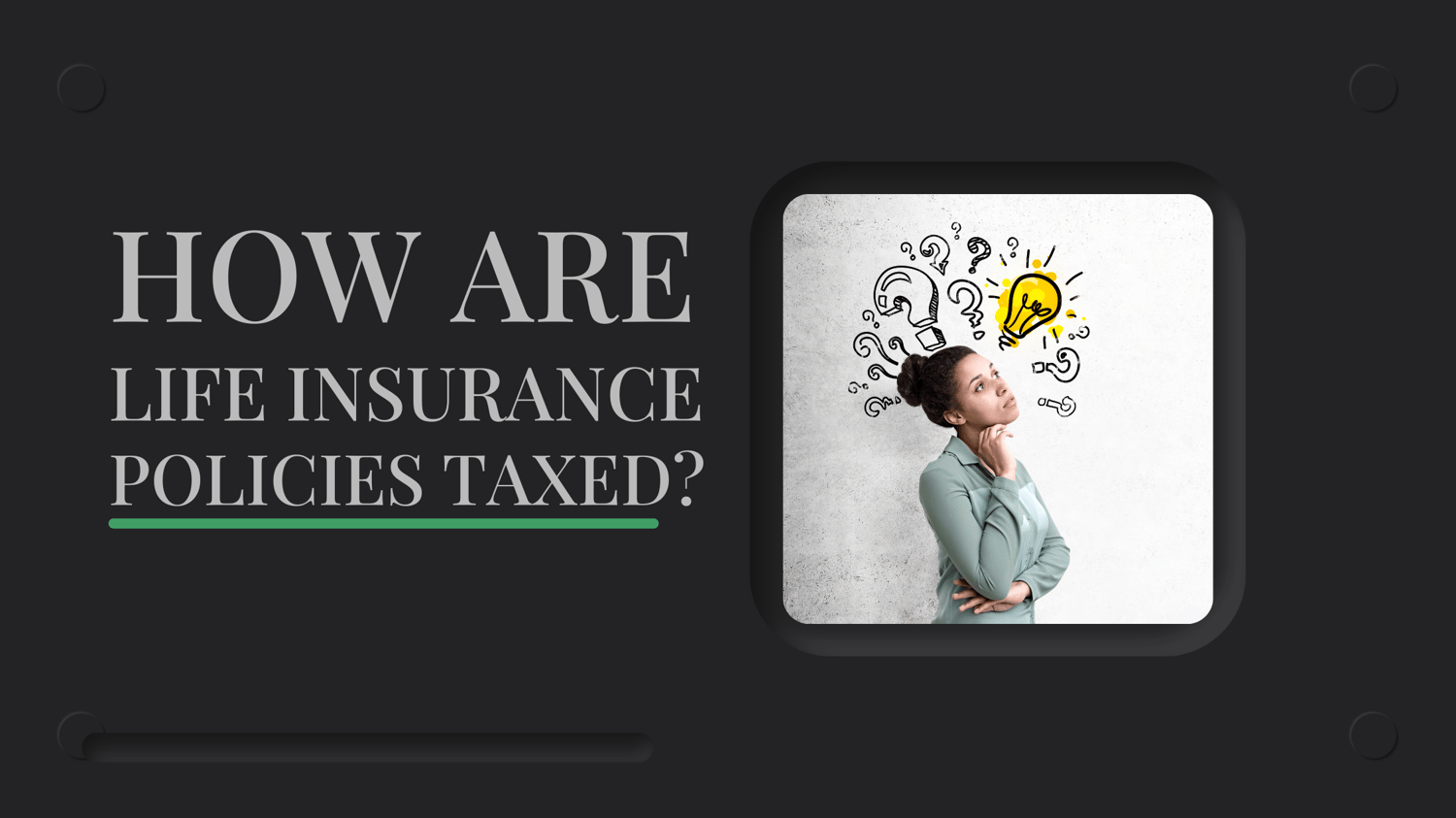Life insurance is a powerful financial tool that provides a safety net for your loved ones after you're gone. Beyond its primary function of ensuring financial security, it can also offer numerous tax benefits. Understanding how life insurance policies are taxed is crucial for maximizing these benefits and making informed financial decisions. In this comprehensive guide, we'll delve into the intricacies of life insurance taxation, shedding light on its various aspects and helping you make the most of this valuable asset.
The Basics of Life Insurance
Before we dive into the tax implications of life insurance policies, let's start with a brief overview of how life insurance works.
Life insurance comes in various forms, but the two primary categories are:
Term Life Insurance: Provides coverage for a specified term (e.g., 10, 20, or 30 years). If the insured person passes away during the policy term, the beneficiaries receive a death benefit. This type of policy typically does not have a cash value component and is generally tax-free.
Permanent Life Insurance: Offers lifelong coverage and includes a cash value component that accumulates over time. Permanent policies, such as whole life and universal life insurance, have different tax implications due to their investment component.
Taxation of Death Benefits
One of the most significant benefits of life insurance is the tax treatment of death benefits. In most cases, the death benefit paid to beneficiaries is entirely tax-free. This means that the beneficiaries receive the full face value of the policy without any income tax liability.
However, there are exceptions to this rule. If your beneficiaries choose to receive the death benefit over a specified period of time, like an annuity, this choice will lead to taxation of the proceeds. In certain circumstances, a portion of the death benefit may be subject to estate taxes or other taxes, depending on the policy's size and the estate planning strategies in place. It's essential to consult with a tax professional or estate planning attorney to understand how estate taxes might affect your life insurance policy.

Cash Value Accumulation and Taxation
Permanent life insurance policies, such as whole life and universal life, come with a cash value component. Part of the premiums paid for these policies goes into a cash account that grows over time. Here's how the taxation of this cash value works:
Tax-Deferred Growth: The cash value of a permanent life insurance policy grows on a tax-deferred basis. This means that you won't pay income tax on the gains as they accumulate within the policy.
Tax-Free Withdrawals: You can often withdraw a portion of the cash value from your policy without incurring income tax. These withdrawals are considered a return of your basis (the amount of premiums paid) and are generally tax-free.
Policy Loans: You can also take out loans against the cash value of your policy. These loans are generally not subject to income tax, but it's crucial to repay them to avoid reducing the death benefit.
Surrendering the Policy: If you decide to surrender your permanent life insurance policy, any gains in the cash value may be subject to income tax. The tax treatment can be complex and depends on various factors, including the policy's cost basis.
Gift and Estate Tax Considerations
Life insurance can play a significant role in estate planning, but it's essential to understand how it might affect your estate's tax liability. Here are some key points to consider:
Ownership Matters: If you own a life insurance policy on your life, the death benefit is usually included in your taxable estate. This means it may be subject to federal estate tax if your estate's total value exceeds the exemption threshold.
Irrevocable Life Insurance Trust (ILIT): To avoid estate taxes on the death benefit, many people establish an Irrevocable Life Insurance Trust (ILIT). The ILIT owns the policy, keeping the death benefit out of your taxable estate.
Gift Tax Implications: If you transfer ownership of a life insurance policy to another person or an ILIT, it may trigger gift tax implications. However, you can use your annual gift tax exclusion and lifetime gift tax exemption to minimize or eliminate the gift tax.
Taxation of Policy Loans and Surrenders
As mentioned earlier, you can take out loans or surrender your permanent life insurance policy to access the cash value. Here's how these transactions are taxed:
Policy Loans: Loans taken against the cash value are generally not considered taxable income because they are loans, not income. However, you should be aware of the interest on the loan, which can accumulate and affect the policy's cash value.
Surrendering the Policy: When you surrender a permanent life insurance policy, any gains in the cash value may be subject to income tax. This tax can be substantial if the policy has been in force for many years and has experienced significant growth.

Taxation of Premiums Paid by Employers
In some cases, employers offer group life insurance as part of their employee benefits package. The tax treatment of these premiums varies depending on who pays for them:
Employer-Paid Premiums: If your employer pays for your life insurance premiums, the first $50,000 of coverage is generally tax-free. However, the portion of coverage exceeding $50,000 is considered taxable income and is subject to income tax.
Employee-Paid Premiums: If you, as the employee, pay for additional coverage beyond the $50,000 threshold, these premiums are typically made with after-tax dollars and are not subject to income tax when the death benefit is paid out to beneficiaries.
Taxation of Dividends and Policy Riders
Some permanent life insurance policies, particularly whole life insurance, may pay dividends to policyholders. These dividends can have specific tax implications:
Dividends as a Return of Premium: Dividends paid by a whole life insurance policy are generally considered a return of premium and are not subject to income tax.
Dividends Used to Purchase Paid-Up Additions: If you choose to use dividends to purchase paid-up additional insurance to your policy, these additions may grow tax-deferred, and you can access them without incurring income tax.
Riders and Taxation: Policy riders, which are additional features or benefits you can add to your policy, can have varying tax implications. It's essential to understand how these riders affect your overall policy and tax situation.
State-Specific Tax Considerations
In addition to federal tax laws, it's crucial to be aware of any state-specific tax considerations related to life insurance. State laws can vary significantly, impacting how policies are taxed and how they fit into your overall financial plan. Consult with a local tax professional or financial advisor to navigate state-specific tax rules.
Life insurance is a valuable tool for protecting your loved ones and building wealth over time. Understanding how life insurance policies are taxed is essential for making informed financial decisions and maximizing the benefits of this financial asset.

While life insurance death benefits are generally tax-free, the taxation of cash value growth, policy loans, and surrenders can be complex. Additionally, estate planning strategies, such as creating an Irrevocable Life Insurance Trust (ILIT), can help minimize estate taxes.
To make the most of your life insurance policies from a tax perspective, consider working with a financial advisor or tax professional who can tailor a strategy to your specific needs and goals. By navigating the tax implications of life insurance effectively, you can secure your family's financial future while optimizing your overall financial plan.
There is no better time to re-evaluate your current situation than the present. Connect with a licensed financial professional at Alfa Pride Financial, to assess where you are on your financial journey, and get the financial keys to a worry-free life. Get started today and book a call.
About the Author
 Xavier Williams is a licensed financial professional and member of the National Association of Insurance & Financial Advisors. He specializes in protection, wealth-building, and wealth-preservation strategies. He helps clients across the U.S. protect their families and businesses with insurance and financial products to secure a brighter future.
Xavier Williams is a licensed financial professional and member of the National Association of Insurance & Financial Advisors. He specializes in protection, wealth-building, and wealth-preservation strategies. He helps clients across the U.S. protect their families and businesses with insurance and financial products to secure a brighter future.



Comments ()